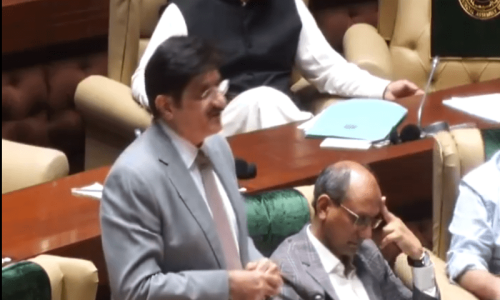KARACHI: As the ruling elite in Pakistan does not want to get affected by the tax system, the system impacts the less privileged segments of society. The prime minister paid a tax of Rs300,000 last year despite having assets worth billions of rupees.
This was said by Dr Ikram-ul-Haq, international tax counsel and Supreme Court advocate, while responding to a comment during the question-answer session at the end of a seminar titled ‘Fiscal allocation for social protection: now is the time’.
The event was organised by the Pakistan Institute of Labour Education and Research (Piler) at a hotel on Saturday evening.
Dr Haq mentioned that the aim of taxation was to have distributive justice, but, he told the attendees, if he disclosed the kind of tax exemption that government officials had, they (attendees) would be amazed. In that regard he was critical of the ‘nexus’ between judges, generals and civil bureaucracy. He was critical of officials belonging to the judiciary, military and civil bureaucracy saying the perks and privileges they were getting were exorbitant, undermining the people’s right to vote.
He said the state imposed unjust taxes on the poor and had reached to a point where it borrowed money even for defence purposes.
Tracing the ills of the system in the 1977 military intervention, he lamented that no one raised any questions about the 1979 income tax ordinance; it was not even debated in the parliament. He also spoke on the goods and services issue, arguing that the provinces had not been allowed to impose tax on goods. He said the federating units had the right to put tax on their goods, not the Centre.
He was of the opinion that the state had deliberately kept the province of Balochistan ‘backward’, which was similar to what the Centre did to Bengalis. “We need to revisit the Constitution,” he commented, adding people had lost faith in the state that was why no one wanted their children to go to state-owned schools.
Piler Executive Director Karamat Ali said social security and social protection had their base in the recognition of citizens’ rights. Quoting a friend, he likened the term social safety net to tightrope walking, suggesting that the net had too many big holes in it.
He urged that the focus of the discussion should be on people’s rights. As to where the sources of these rights were, he gave many examples from the Constitution, such as Article 9 that ensured the right to life with dignity.
Mr Ali touched upon the lack of implementation on the principles of policy. He also talked about the different social protection institutions (Baitul Maal, Microfinance, Benazir Income Support Programme etc) claiming that they did not cover even 10 per cent of people, hence their fiscal allocations should be increased.
Haris Gazdar, who works for Collective for Social Science Research, gave a historical perspective of the concept of social protection. He went back to the time period in Europe when the tussle among the church, landlords and the monarchy created different classes, as a result of which it was decided that the king or the clergy could not usurp anyone’s property. The taxation system too had the same background, he said.
Mr Gazdar highlighted the importance of political, economic and civil rights of the people and reasoned that their rights would not be complete unless they had the necessary resources to lead a dignified life. In the context of social protection, he laid special emphasis on housing, suggesting lack of shelter was a major insecurity of the labour class.
Syed Akbar Adil Shah, who represented the Employees Old-Age Benefit Institution, shared the issues that his organisation faced after the 18th amendment.
Clarifying his position on the principles of policy issue raised by Mr Ali, PPP senator Saeed Ghani said issues were being discussed on that platform ever since Raza Rabbani took charge of the senate, so much so that now ministers made sure that they arrived prepared in the senate.
When the floor was opened for questions, the speakers received a series of queries.
Replying one of them, Dr Haq said the ruling elite did not want to be impacted by taxation, which was why it was the poor segments of society that bore the brunt of it. He said we adopted a system left to us by the British that ironically the British themselves did not implement anymore. He gave the example of Finland that at one time was faring worse than Pakistan, but was on top when it came to transparency because “it does not allow concentration of wealth”.
The proceedings were conducted by Zeenia Shaukat.
Published in Dawn, May 24th, 2015
On a mobile phone? Get the Dawn Mobile App: Apple Store | Google Play















































Dear visitor, the comments section is undergoing an overhaul and will return soon.